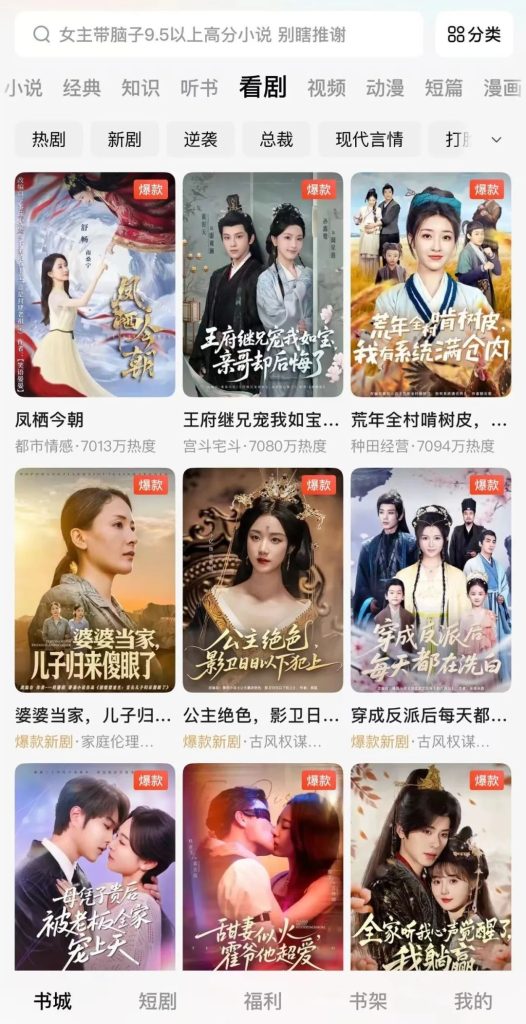
Read More《站内短剧,会成为网文平台的新“赛点”吗?》
Positive Reviews: Short dramas becoming the “second curve” for online literature platforms to break through and achieve growth
In 2024, the impressive data of the digital reading market (total revenue of 66.141 billion yuan and a user scale of 670 million) resonated strongly with the explosion of the short drama market (a user scale of 662 million and a market size of 50.4 billion yuan). Behind the collective move of online literature platforms towards “short dramas”, there is a strategic breakthrough centered around the extension of the content ecosystem, the in – depth exploration of user value, and the upgrading of commercial monetization. Its positive significance is mainly reflected in the following four dimensions.
I. Breaking through the ceiling of user growth and activating the dual value of existing and new users
For new – force platforms such as Fanqie and Qimao, under the pressure of the slowdown in the growth rate of the digital reading user scale (the user growth rate was 17.52% in 2024, but the leading platforms were approaching saturation), short dramas have become a key weapon in the “battle for user time”. Fanqie Novel seamlessly connects text reading with video viewing through the in – app “Watch Dramas” section, precisely meeting the users’ need to “watch dramas directly when they are tired of reading”. As a result, the number of daily active users increased by 70% year – on – year. Qimao users “can’t stop once they start watching a short drama”, which directly extends the platform usage time. This composite scenario of “reading + short dramas” not only retains the attention of existing users but also attracts new users who originally had limited interest in long – text reading (especially users in third – tier and lower – tier cities, as the user profiles of Fanqie short dramas highly overlap with those in the sinking market) through the strong entertainment attribute of short dramas.
II. Multi – dimensional development of IPs and releasing the long – tail value of content assets
The core assets of online literature platforms are high – quality IP inventories, and the characteristics of “strong conflict and fast pace” of short dramas are highly consistent with the narrative genes of short – form online literature. Through the “IP adaptation cooperation” project, Fanqie Novel directly transforms online novels such as A Good Good Girl and The Cheat into short dramas, which not only addresses the authors’ concerns about copyright but also extends the IP from the text form to the video form, forming a closed – loop of “one – time creation, multiple monetizations”. More notably, Fanqie has also extended its reach to the publishing field. For example, it adapted Cai Jun’s The Story of X into a short drama, exploring the multi – genre transformation of traditional publishing content. Zhangyue Technology produced short dramas through its subsidiary, Xi’an Yuexian. In 2024, the revenue from derivative business accounted for 25.26%, becoming an important growth pole. This chain – style development of “IP – short drama – other derivatives” upgrades online literature content from single – form reading payment to a “content ecosystem” covering multiple forms such as film and television, animation, and short dramas, significantly increasing the upper limit of the commercial value of IPs.
III. The rise of the free model, meeting the needs of users in the sinking market
In 2024, the market share of free short dramas soared from 11% to 50%, surpassing the paid model. This trend is highly compatible with the “free gene” of online literature platforms. As early adopters of the free reading model, Fanqie and Qimao have a relatively high user acceptance of “free content”. Tencent launched the “Mars Drama Watching” and “Short Dramas” mini – programs, labeled as “free and high – quality dramas with good reviews across the network”. By leveraging the social sharing function of WeChat, it expanded the spread, essentially combining free short dramas with social fission to further lower the user access threshold. The free model not only meets the demand of users in the sinking market for “high – cost – performance entertainment” (users in third – tier and lower – tier cities account for more than 50%) but also provides a new monetization path for online literature platforms – replacing traditional paid reading (IAP model) with advertising (IAA model), which not only expands the user base but also increases the revenue scale through the investment of advertisers.
IV. Promoting industry integration and facilitating national reading and cultural dissemination
Examples such as the daily active users of Fanqie Novel’s e – publications exceeding 10 million and The God – Slaying in the Mortal Realm being short – listed for the Best Animation Award at the Magnolia Awards show that the short – drama transformation of online literature platforms is not just a simple commercial behavior but also promotes the social values of “national reading” and “cultural dissemination”. For instance, short dramas adapted from classic published works (such as The Story of X) lower the reading threshold through the video form, allowing more users to access high – quality literary content. The overseas distribution of short dramas (such as Married into the Eastern Palace by Chinese Online) extends the influence of online literature IPs from the domestic market to the international market, becoming a new carrier of cultural output.
Negative Reviews: Hidden Concerns and Challenges in the Short – Drama Craze
Although the strategic logic of the short – drama transformation of online literature platforms is clear, the problems exposed during the rapid expansion are also worthy of vigilance. From content quality to commercial competition, from IP value to regulatory risks, multiple challenges may affect the long – term healthy development of this track.
I. Severe content homogenization and insufficient supply of high – quality content
Currently, most of the hit short dramas in the market are concentrated in genres such as “urban romance”, “tragic love”, and “rich and powerful presidents” (Qimao has 67 categories of short dramas, but the core themes are highly repetitive). The problems of content standardization and plot routinization are prominent. For example, in order to pursue “fast pace”, some short dramas sacrifice the story logic and character depth, and even feature low – quality content such as “giving birth to 99 children in one pregnancy” (such as the controversial case shut down by Kuaishou). Although online literature platforms have rich IP inventories, not all IPs are suitable for adaptation into short dramas. Short – form online literature with strong plots may be suitable, but forcing the short – drama transformation of some medium – and long – form IPs that require delicate foreshadowing may lead to “the loss of original fans” or “indifference among new users”. If platforms pursue quantity while ignoring quality, short dramas may become “fast – food for traffic” and fail to form long – term user stickiness.
II. Over – development of IPs may dilute the value of the original works
The multi – genre development of IPs requires a balance between “commercialization” and “artistry”. Some online literature platforms may over – consume IP resources in order to achieve quick monetization. The same IP may be adapted into multiple versions such as short dramas, films, and animations, but the content quality varies, leading to user confusion about the IP. For example, if the short – drama adaptation of a certain online novel is criticized for its rough plot, it may have a negative impact on the reputation of the original work and affect the subsequent development of other forms. In addition, in order to meet the needs of short – drama adaptation, some authors may deliberately pursue “strong conflict and fast pace” in their writing, resulting in a decline in the literary quality of online literature. In the long run, this may damage the content foundation of the online literature industry.
III. Intensified platform competition, with costs and risks rising simultaneously
The popularity of the short – drama track has attracted multiple players such as Fanqie, Qimao, Chinese Online, and Tencent to enter the market. The competition has spread from “content” to “ecosystem”. For example, Fanqie has the traffic support of the ByteDance ecosystem (Hongguo Short Dramas, Douyin), Tencent relies on the WeChat social chain (the sharing function of short – drama mini – programs), Qimao benefits from Baidu’s user access ability, and established platforms such as Chinese Online have built their own “Wild Elephant Short Dramas” platform. This competition may drive up the costs of IP procurement, production, and traffic promotion, squeezing the profit margin. Take Kuaishou as an example. The monthly active users of its paid short – drama platform, Xifan Short Dramas, were only 4.269 million, far lower than the 173 million of Hongguo Short Dramas. Eventually, it shut down due to the shrinking of the paid – drama model, indicating that in a market dominated by the free model, platforms that cannot quickly form economies of scale may face the risk of being eliminated.
IV. Increasing regulatory pressure, and content compliance has become a key challenge
The “short, flat, and fast” characteristics of short dramas make content review more difficult than that of long – form videos. Some platforms may relax content control in order to pursue traffic, resulting in problems such as vulgarity, violence, and distorted values (such as the controversial content of “giving birth to 99 children in one pregnancy” mentioned above). Since 2024, regulatory authorities have issued several regulatory documents regarding the content of short dramas, requiring enhanced originality and the elimination of vulgarity. If online literature platforms ignore compliance in short – drama development, they may face risks such as下架, fines, or even platform bans, which will affect the stability of their overall business.
Suggestions for Entrepreneurs: Grasp “Long – Termism” in the Short – Drama Wave
Although the short – drama transformation of online literature platforms provides opportunities for entrepreneurs, they also need to avoid risks. Based on the current industry situation, the following suggestions are worth considering:
I. Focus on “content quality” and avoid homogeneous competition
Entrepreneurs should break away from the “traffic – first” mindset and focus on the “suitability” and “innovation” of IPs. On the one hand, they should give priority to adapting online literature IPs with compact plots and concentrated conflicts into short dramas, avoiding the forced “compression” of medium – and long – form IPs. On the other hand, they should try to be different in theme selection (such as combining traditional culture and real – life themes) and reduce their reliance on routine content such as “rich and powerful presidents” and “sweet romances”. For example, Fanqie’s attempt to adapt the published work The Story of X is an expansion of the theme boundary and is worthy of reference.
II. Build an “IP development matrix” and balance short – term monetization with long – term value
The multi – genre development of IPs requires a clear strategic plan. Short dramas can serve as a “traffic entry point” to quickly attract users and at the same time guide traffic to long – form content such as films and animations. The good reputation of long – form content can in turn enhance the IP value of short dramas. For example, the animation of The God – Slaying in the Mortal Realm by Fanqie was short – listed for the Magnolia Awards, which enhanced the influence of the original online novel, and its short – drama adaptation is more likely to gain user trust. Entrepreneurs should avoid “one – time consumption of IPs” and instead extend the life cycle of IPs through a step – by – step development of “short dramas – long dramas – peripherals”.
III. Pay attention to changes in user needs and strengthen the ability of “scenario – based services”
The core need of users for short dramas is “fragmented entertainment”. Therefore, entrepreneurs need to optimize the “scenario adaptation” of the platform. For example, Fanqie’s in – app “Watch Dramas” section is classified by “time background” and “character settings” to help users quickly find their favorite dramas. The “social sharing” function of Tencent’s short – drama mini – program uses the WeChat ecosystem to expand the spread. Entrepreneurs can conduct refined operations on classification labels, interactive design, and sharing mechanisms based on the user profiles of their own platforms (for example, users in the sinking market prefer “down – to – earth” content) to improve the user experience.
IV. Establish a “compliance firewall” and actively respond to regulatory risks
Content compliance is the “lifeline” of the short – drama business. Entrepreneurs need to establish a professional content review team and use AI technology (such as keyword recognition and plot prediction) to assist in the review to avoid the上线 of vulgar and违规 content. In addition, they need to closely monitor regulatory dynamics (such as the content regulations of short dramas issued by the National Radio and Television Administration) and actively adjust the creative direction. For example, increasing real – life themes and positive – energy content can not only avoid risks but also enhance the social image of the platform.
V. Rationally evaluate costs and benefits and avoid blind expansion
The costs of short – drama production (IP licensing fees, shooting costs, and traffic promotion) may increase with the intensifying competition. Entrepreneurs need to make financial plans to avoid “sacrificing profits for scale”. For example, they can give priority to cooperating with small – and medium – sized IPs (to reduce licensing costs), test the market feedback through “low – cost, high – creativity” short dramas, and then gradually increase the investment in high – quality IPs. At the same time, they can explore diversified monetization models (such as advertising revenue sharing and membership value – added services) to reduce their reliance on a single source of income.
Conclusion
The short – drama transformation of online literature platforms is not a “blind following” but an inevitable choice for the evolution of the content industry from “text – video – ecosystem”. It not only provides an opportunity for platforms to break through the growth bottleneck but also places higher requirements on content quality, IP operation, and compliance ability. In the coming year, the platforms that can achieve new market scale will surely be those long – termists who “understand user needs, adhere to content standards, make good use of IP assets, and can continuously innovate”. Those who are left behind in the race may be the short – sighted ones who are obsessed with the “traffic game” and ignore the core value.



